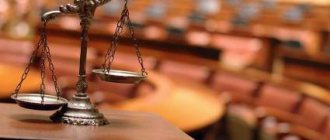Debate between the parties in criminal proceedings allows the judge to form an internal conviction and defend the participants’ own interests.
Along the way, it is possible to illuminate the framework of the process from different sides, ensuring objectivity and comprehensiveness of the approach, which is the basis for making a fair decision. Multi-channel free hotline Legal advice on criminal law. Every day from 9.00 to 21.00
Moscow and region: +7 (495) 662-44-36
St. Petersburg: +7 (812) 449-43-40
Statements by the parties
What is a pleading between the parties in a criminal trial? Article 292 of the Criminal Code regulates the composition and procedure for conducting debates.
- prosecutor;
- lawyer
Expressing their position is a mandatory step and cannot be excluded from the trial.
When the prosecutor refuses to argue, this is perceived as a refusal of the stated charges. Such a position of the state prosecutor must be justified in a prepared statement in accordance with Part 7 of Art. 246 Code of Criminal Procedure. Failure to speak out on the part of the defense attorney is seen as a refusal to defend his client. Such behavior is prohibited by part 7 of article 49 of the Code of Criminal Procedure. The accused can speak out even if a free lawyer is not available.
You can speak out and express your own position relying on the evidence presented during the proceedings. Documents that were not previously included in the document flow and are not relevant to the case are not taken into account by the judge.
The debate between the parties to the Code of Criminal Procedure is limited by time. When discussing circumstances not related to the case, the presiding judge has the right to stop the narration. The sequence in which all participants speak is determined by the court; this is indicated in Part 3 of Article 292 of the Code of Criminal Procedure. The prosecutor is the first to express his position, the last in this chain to express his opinion is the lawyer of the accused or himself.
In the CPC debate, each party to the process has the opportunity to make a remark, that is, a remark regarding the position expressed by the other parties to the case. Nobody obliges you to do this, and the law states the right to refuse to make your last speech.
Even the court is prohibited from limiting the last word, and during its utterance the defendant is prohibited from asking questions. If new circumstances or evidence in the last speech are revealed, the investigation is resumed.
The court then heads to the conference room to make a final decision on the case. An appeal against a decision occurs after the verdict has been announced.
Article 292 of the Code of Criminal Procedure of the Russian Federation. Contents and order of debate between the parties (current edition)
1. Judicial debates represent a stage of judicial proceedings at which the parties involved in the case, in oral presentations, express their position on the case, based on the results of the judicial investigation.
2. The defendant has the right to participate in judicial debates only on the condition that he refuses to have a defense attorney participate in the case. If the defense attorney is absent for other reasons (failed to appear at the court hearing, suddenly fell ill, etc.), the court must take measures to provide the defendant with another defense attorney in accordance with Art. 50 of this Code, if necessary, declaring a break in the court hearing or postponing the trial.
3. The victim has the right to speak in court arguments on behalf of the prosecution (clause 15, part 2, article 42). Part 2 of this article, in particular, states that a civil plaintiff, a civil defendant, and their representatives have the right to apply for participation in the debate of the parties. It should, however, be borne in mind that the civil plaintiff, civil defendant, as well as their representatives, by virtue of the direct instructions of the law (clause 15, part 4, article 44; clause 11, part 2, article 54) also have the right to act in judicial debates. Therefore, the court cannot refuse their petition.
4. Despite the fact that Part 3 of this article states that the sequence of speeches of the participants in the debates of the parties is established by the court, the discretion of the court in this matter is limited to the subsequent sentence, in which the sequence of participation of the parties in the debates is established quite strictly. The discretionary powers of the court to establish the sequence of speeches in the debates practically concern only those cases when several prosecutors, defenders, defendants, etc. are involved in the case. The commented article does not provide that the court establishes the sequence of speeches of several prosecutors, defense attorneys and other participants of the same name in the trial who have the right to speak in the debate of the parties, at their proposal. However, other things being equal, the court should listen to the views of the parties and take them into account when making a decision on this issue. As for the defenders, it is first advisable to give the opportunity to speak to those of them whose position, if expressed in the debate, may entail a worsening of the position of other defendants (for example, when one defendant incriminates another), since their defenders then have the opportunity to fend off arguments that have become known to them from the speech of a colleague who spoke earlier. In practice, the court usually hears the defenders of the perpetrators, then the organizers of the crime and after them - the defenders of those accomplices who played a less noticeable role in the commission of the crime.
5. The subject of speeches by the parties in judicial debates may be the assessment of evidence examined in the judicial investigation; legal assessment of procedural violations committed during the proceedings and their possible consequences; characteristics of the circumstances established in the trial; legal assessment of the circumstances of the case (qualification of the crime, conclusion about the innocence of the defendant); characteristics of the defendant's personality; considerations regarding the imposition of punishment or the possibility of releasing the defendant from criminal liability and punishment; considerations on issues related to a civil claim; coverage of the public significance of this case. Not all participants in legal proceedings speaking in the debate must give answers to all of the above questions in their speeches; this is the absolute responsibility of only the public prosecutor and defense attorney. A private prosecutor has the right, but is not obligated, to express to the court his opinion on the merits of the accusation, on the application of the criminal law and on the sentencing of the defendant in judicial debates (Part 5 of Article 321).
6. The content of the speeches of the participants in the debate of the parties is limited to certain limits. They do not have the right to refer to support their position: a) to evidence that was not examined during the judicial investigation, including scientific works on criminology and forensic examination; b) on evidence declared inadmissible by the court; c) to circumstances not related to the case under consideration. In these cases, the presiding officer must stop the participant in the judicial debate, drawing his attention to the inadmissibility of such actions. It seems that the presiding officer is also obliged to stop the participants in the debate if they use offensive or indecent expressions or threats against the participants in the proceedings; statements that can be qualified as a crime or an administrative offense (for example, incitement to national, racial or religious hatred, contempt of court, etc.).
Comment source:
Ed. A.V. Smirnova “COMMENTARY ON THE CRIMINAL PROCEDURE CODE OF THE RUSSIAN FEDERATION” (ARTICLE BY ARTICLE), 5th edition
SMIRNOV A.V., KALINOVSKY K.B., 2009
Prosecutor in a criminal trial
Everything that the prosecutor did during the investigation, the evidence collected, the approved position, is summed up in a monologue in court. The blocks and the sequence of their presentation in the constructed monologue may differ depending on the circumstances in the case.
- Reveal the violation of the law and the illegal act committed by the accused.
- Provide evidence to prove guilt.
- Mark evidence that is not confirmed, on the basis of which it should be rejected by the court.
Well-chosen arguments help the prosecutor convince the court of the correctness of his position. The punishment is announced and the personality of the accused is assessed. Based on Articles 39 and 37 of the Code of Criminal Procedure, the severity of the crime, its type and nature are described. For example, they were accused of theft, or perhaps they proved participation in fraud.
The prosecutor must justify the classification of the illegal act.
The actions of the defendant must constitute a crime and be charged under a specific article of the Criminal Code.
It is important to know the content and follow the order of the parties' debates, in accordance with which the parties' debates take place. The prosecutor should not indicate exact terms for individual penalties. In legal proceedings, this is the prerogative of the court. If there is damage, the prosecutor can put forward his thoughts on how it should be compensated to the injured party.
Another comment on Art. 292 of the Criminal Code of the Russian Federation
1. The subject of the crime is an official document, i.e. a document adopted by the legislative, executive and judicial authorities, which is mandatory, advisory or informational in nature. However, judicial practice proceeds from the fact that not every official document in this context is the subject of official forgery. Within the meaning of Art. 292 of the Criminal Code of the Russian Federation, the subject of official forgery is only those documents that certify events or facts that have legal significance and entail corresponding legal consequences, or documents that provide rights, impose obligations or relieve them from them.
2. The objective side of official forgery is expressed in one of the following actions: a) entering into official documents knowingly false information (intellectual forgery) - involves the initial drawing up of a document that does not correspond in content to reality, false in essence. If, as a result of intellectual forgery, a person illegally acquires citizenship of the Russian Federation, the act is qualified according to a special norm - Part 1 of Art. 292.1 CC; b) making corrections to official documents that distort their actual content (material forgery) - involves changing an initially authentic document by removing part of the information and (or) supplementing it with information that does not correspond to reality, as a result of which the assessment of all information contained in the document is distorted. Methods of material forgery can be marking with a different number, erasing, etching inscriptions, etc.
3. The subjective side of official forgery is characterized by direct intent and the presence of a special motive: selfish or other personal interest.
4. The qualified corpus delicti provides for cases where official forgery significantly violates the rights and legitimate interests of citizens or organizations or the interests of society or the state protected by law. In fact, Part 2 is a special rule in relation to Part 1 of Art. 285 of the Criminal Code of the Russian Federation.
Third commentary to Article 292 of the Criminal Code of the Russian Federation
1. The object of this crime is the normal activities of government bodies related to the circulation and release of official documents into circulation.
2. As the subject of this crime, official documents are used, which include those that come from a certain legal entity (not necessarily from a government body) and contain all the features of an official document, i.e. recognized by law. An official document is one that has the attribute of publicity. This is expressed in the fact that the document has a generally accepted form, is addressed to an indefinite range of subjects of legal relations and is recorded on a material storage medium (paper, magnetic and electronic media, etc.). An official document acquires legal force from the moment it is signed by an official who has the right to sign (the right to sign). Of great importance for the full disclosure of the concept of “official document” are: Federal Law of July 27, 2006 N 149-FZ “On Information, Information Technologies and Information Protection”, Unified Rules for the Preparation of Official Documents, approved by the Decree of the President of the Russian Federation of January 20, 1994. “On the fundamentals of state policy in the field of informatization” (as amended on July 9, 1997) (Collection of acts of the President and Government of the Russian Federation. 1994. N 4. Art. 305), which determine the main provisions and procedure for drawing up and signing documents by officials state bodies. Receipts for goods, receipts, warranty cards for household appliances are not considered official documents, since they do not have the above characteristics (publicity, signing by a competent official). They are documents for internal use of commercial organizations and cannot be considered as the subject of official forgery.
3. From the objective side, official forgery is formal and complete from the moment knowingly false information is entered into official documents, as well as corrections are made to said documents that distort their actual content. The use of a forged document, as well as the consequences caused by it, are beyond the scope of the crime in question and are not included in the subject of proof. All further actions related to the use of a forged document and their consequences can be assessed as involving the commission of two or more crimes and are subject to legal assessment through the prism of complicity or a combination of crimes. A qualified element of this crime is the commission of an act that entailed a significant violation of the rights and legitimate interests of citizens or organizations or legally protected interests of society or the state (see commentary to Article 285 of the Criminal Code).
4. The subjective side of official forgery is characterized by guilt in the form of direct intent, in which the person is aware of the unlawful nature of the act and wishes to commit it. According to Part 2, the subject additionally strives for a significant violation of the legally protected interests of citizens, society and the state as a material consequence, and in this case must foresee these consequences. The mental attitude of an official towards forgery must necessarily be associated with the presence of selfish or other personal interest. Self-interest is expressed in the desire to benefit for oneself. This benefit can be material (the right to property) or intangible (the right to dispose of certain objects of intellectual property). The legislative formula “other personal interest” implies a fairly wide range of motives of an official: career goals, sick vanity, protectionism, concealing the unfavorable results of one’s official activities, etc.
5. The subject of the crime is special.
Officials, state or municipal employees who have a certain time frame for the exercise of their official and official powers and perform certain functions are subject to liability. The commission of forgery must be associated with the permanent or temporary stay of the person in the relevant position. ‹ Article 291.2. Petty briberyTop Article 292.1. Illegal issuance of a passport of a citizen of the Russian Federation, as well as entering deliberately false information into documents, resulting in the illegal acquisition of citizenship of the Russian Federation ›



